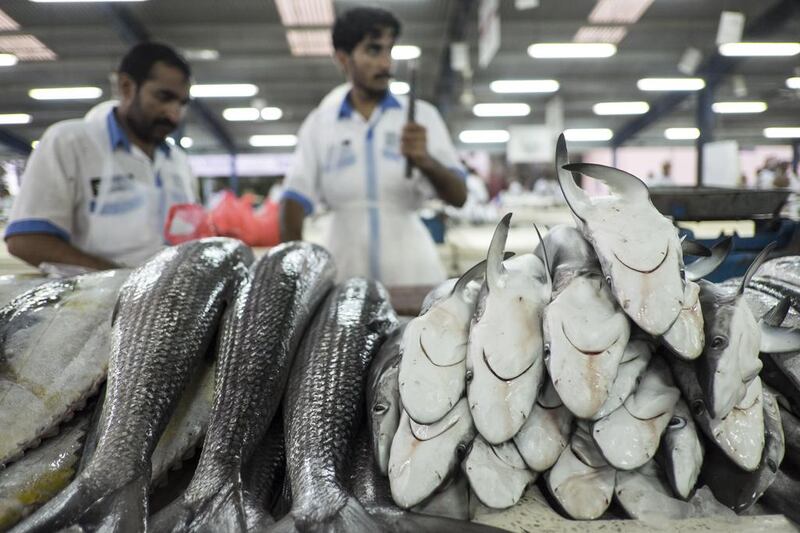Species protected by an international convention seem not be sold at local markets, thanks to a law enacted this year
DUBAI // “Come! Shark! Come!” an enthusiastic trader at Deira fish market hollered at potential customers.
But his animated sales pitch did not match his wares, with only two small fish laid out at his stall. Neither was from a protected species, in stark contrast with recent years when rare sharks were openly sold at markets across the UAE.
Dubai has gained significant attention as a link in the global trade in sharks. Many, caught off the coast of the UAE, Oman and elsewhere in the region, have been sold to exporters.
However, between 5pm and 6pm, the period when the catch of the day arrives at the auction area, large sharks were absent at Deira fish market. This was also the case at markets in Fujairah and Kalba.
Officials at the Ministry of Environment and Water credit it to tougher regulations introduced last month.
Sultan Alwan, assistant undersecretary for water resources and nature conservation at the ministry, says UAE law prohibits the fishing of any species listed on the Convention on the International Trade in Endangered Species of Wild Fauna and Flora (Cites). “Fishermen have to ensure that they release these species if they are accidentally caught in their nets,” he said.
Ministerial resolution 500 for this year, which took effect last month, introduced a number of restrictions on shark fishing, including a ban on capturing shark species protected under Cites.
The law allows for the trade of Cites-listed species, if the right paperwork is present, but prohibits the re-export of shark fins.
“The new rules regulate the trade in shark species in line with our international obligations and the ministry’s vision to conserve our natural resources,” said Mr Allwan, adding that the ministry was working to distribute information on the decree to fishermen and traders, along with a shark-identification workshop.
There is still demand for fresh and dried shark meat, and the most lucrative trade is the sale of shark fins to China, Hong Kong and other parts of Asia.
Dr Elsayed Mohamed, the regional director for the Middle East and North Africa at the International Fund for Animal Welfare, was measured in his optimism when asked about the effect that the new regulations were having. “It is better to wait and see,” he said, adding that more time was needed to evaluate the effectiveness of the new rules. But they were “a very encouraging sign”, he said.
Although Cites does not prohibit the capture of the sharks it protects – they include the whale shark and three species of hammerhead sharks common in UAE water – it applies restrictions on export and re-export.
International trading is allowed only with paperwork issued by the relevant authorities in the country of origin.
By banning the capture of Cites-protected sharks in its waters, the UAE is imposing “higher restrictions than Cites” on its fisheries, according to Dr Mohamed.
“This act is really important not for the UAE only but also for the region. It signals that the UAE would not be involved in the shark problems as previously,” he said.
Despite the new restrictions, trading of the Cites-protected sharks could continue in the UAE, provided the sharks are not caught locally and have the appropriate paperwork from their countries of origin. But the increased controls would probably reduce demand for sharks, said Dr Mohamed.
Although there were no signs of large Cites-protected sharks available for sale at local fish markets, several stalls at each location offered sharks from smaller species, such as the Arabian smooth-hound.
Trading for about Dh20 a kilogram, small sharks are cooked in popular local dishes.
“My guess would be that these are all by-catch of other gillnet fisheries,” said Dr Will White, a zoologist expert on fish at the CSIRO, Australia’s national science agency.
When seeing small sharks, most people think they are juvenile, but this is not necessarily the case, according to Dr White, who reviewed pictures that The National took at the fish markets.
He said some of the sharks could be newborns from larger species, although capturing them could have limited impact because juveniles have a naturally high mortality rate.
“Protecting the breeding population can have more impact than protecting the capture of juveniles,” said Dr White. “But obviously if the level of impact on juveniles is very big then that can be a problem.”
The ministry says it has been protecting juvenile sharks by banning shark fishing during the breeding season.
The new decree extends the ban from February 1 until the end of June to ensure that juvenile sharks and pregnant females are not affected.
vtodorova@thenational.ae





